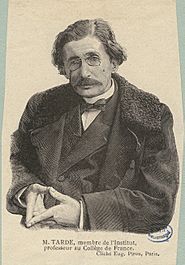Gabriel Tarde facts for kids
Quick facts for kids
Gabriel Tarde
|
|
|---|---|

Portrait by Eugène Pirou
|
|
| Born | 12 March 1843 Sarlat-la-Canéda, Dordogne, France
|
| Died | 13 May 1904 Paris, France
|
| Alma mater | University of Toulouse University of Paris |
| Scientific career | |
| Fields | Sociologist, criminologist and social psychologist |
| Institutions | Collège de France |
| Influences | Antoine Augustin Cournot, Gottfried Wilhelm Leibniz |
| Influenced | Alexandre Lacassagne Eugen Lovinescu Bjorn Thomassen Paolo Virno Peter Sloterdijk Serge Moscovici Everett Rogers W. I. Thomas Florian Znaniecki Robert E. Park Sigmund Freud B. R. Ambedkar Bruno Latour Tony D. Sampson Gilles Deleuze |
Gabriel Tarde (French: [taʁd]; born Jean-Gabriel De Tarde; 12 March 1843 – 13 May 1904) was an important French thinker. He was a sociologist, someone who studies how societies work. He was also a criminologist, studying crime and criminals, and a social psychologist, looking at how people's minds affect society.
Tarde believed that society is built from many small interactions between individuals. He thought these interactions were like chemistry, where tiny parts combine to make something bigger. His main ideas were about imitation (copying others) and innovation (creating new things).
Contents
Gabriel Tarde: Life and Career
Tarde was born and grew up in Sarlat, a town in France. He studied law at universities in Toulouse and Paris.
From 1869 to 1894, he worked as a judge in his home province. During this time, he became interested in understanding why people commit crimes. He talked with other experts in the field, like Enrico Ferri and Cesare Lombroso from Italy, and Alexandre Lacassagne from France. Tarde and Lacassagne became key figures in what was known as the "French school" of criminology.
In 1900, Tarde became a professor of modern philosophy at the Collège de France, a famous school in Paris. He was known for disagreeing with another famous sociologist, Émile Durkheim, about how society should be studied.
Tarde's Big Ideas About Society
Gabriel Tarde came up with several important ideas that are still talked about today. He thought a lot about how people influence each other and how new ideas spread.
How People Copy Each Other: Imitation
Tarde believed that imitation is a very basic part of human behavior. He thought that people, often without even realizing it, copy others. For example, children often imitate their parents. He said this copying happens because of prestige, meaning we tend to copy people we look up to or admire.
He also thought that creative people, or "geniuses," are important because they come up with new ideas that others then imitate. He said that a genius is someone who can create their "own children" in terms of ideas.
Understanding Crime: Criminology
While working as a judge, Tarde became very interested in why people commit crimes. He studied the psychology behind criminal behavior. He didn't agree with some ideas at the time, like the idea that criminals were born that way or were "atavistic" (meaning they were like earlier, less developed humans).
Instead, Tarde focused on how criminals might repeat their actions. He noticed that criminals often return to the scene of a crime or repeat similar crimes. He saw this as part of a wider pattern of repetition compulsion, where people feel a strong urge to repeat certain behaviors.
The Group Mind and Economic Psychology
Tarde also talked about the idea of a "group mind." This concept was later developed by others to explain things like herd behaviour or crowd psychology, where people in a large group might act in similar ways.
He also explored economic psychology, which looks at how people's thoughts and feelings affect their economic choices. He predicted some modern ideas in this field.
Tarde's Science Fiction Story
Gabriel Tarde wasn't just a sociologist; he also wrote a science-fiction novel! It was called Underground Man (or Fragment d'histoire future, published in 1896).
The story is set after a new Ice Age has destroyed Earth. Humanity has to build a new civilization underground. They decide to create a perfect society based on music and art.
How Tarde Influenced Other Thinkers
Even though some of his ideas were not popular at first, Gabriel Tarde's work has influenced many important thinkers over the years.
- Sigmund Freud, a famous psychologist, used Tarde's ideas about imitation and suggestion when he wrote about how groups of people behave.
- Everett Rogers used Tarde's "laws of imitation" to explain how new ideas and products spread through society in his 1962 book Diffusion of innovations.
- More recently, Tarde's work has become popular again. Modern thinkers like Bruno Latour have seen Tarde as an early influence on their own ideas about how society works.
- His ideas have also influenced the study of how emotions and feelings spread, especially on digital networks, which is called "affect philosophy."
Books by Gabriel Tarde
- La criminalité comparée (1886)
- La philosophie pénale (1890) – Translated as Penal Philosophy
- Les lois de l'imitation (1890) – Translated as The Laws of Imitation
- Les transformations du droit. Étude sociologique (1891)
- Monadologie et sociologie (1893)
- La logique sociale (1895)
- Fragment d'histoire future (1896)
- L’opposition universelle. Essai d'une théorie des contraires (1897)
- Écrits de psychologie sociale (1898)
- Les lois sociales. Esquisse d'une sociologie (1898) – Translated as Social Laws - an Outline of Sociology
- L'opinion et la foule (1901)
- La psychologie économique (1902–3)
- Fragment d'histoire future (1904) – Translated as Underground Man
See Also
 In Spanish: Gabriel Tarde para niños
In Spanish: Gabriel Tarde para niños
- Diffusion
- Propaganda
- Public opinion, one of Tarde's key concepts
- Serge Moscovici
 | Jessica Watkins |
 | Robert Henry Lawrence Jr. |
 | Mae Jemison |
 | Sian Proctor |
 | Guion Bluford |

